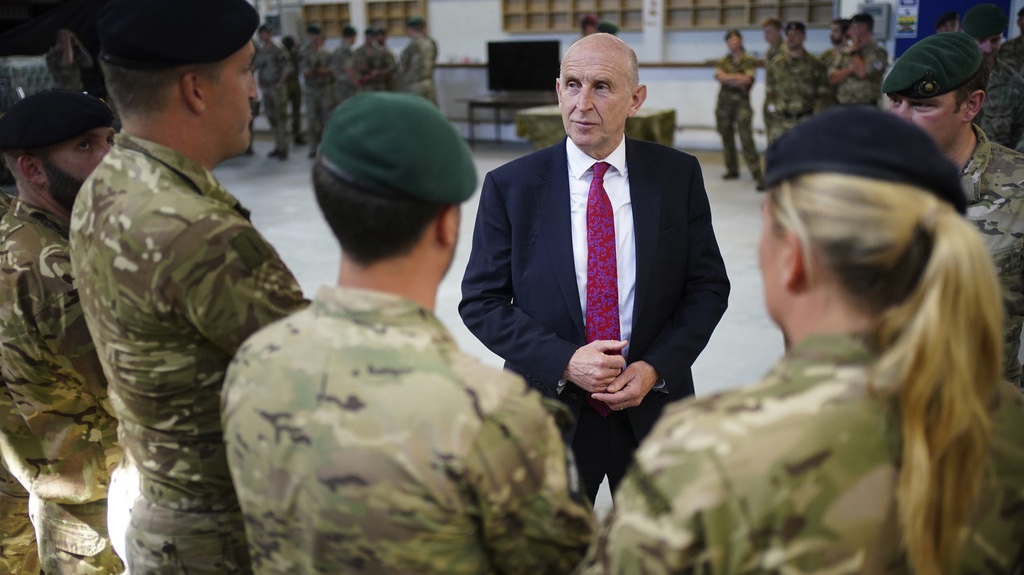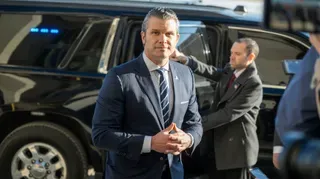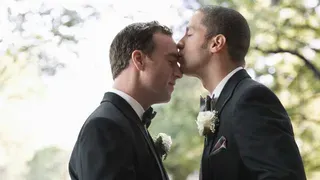October 12, 2016
EDGE Exclusive Interview with Hillary Clinton
Matthew Wexler READ TIME: 10 MIN.
As the presidential race continues to spiral in unexpected directions, one thing is clear: LGBT issues have been lacking from much of the mainstream media coverage. Perhaps many -- even within our own community -- feel that with the passing of same-sex marriage in June 2015, the work is done.
But with backwards actions like North Carolina's Public Facilities Privacy & Security Act, an anti-LGBT law signed by Governor Pat McCrory earlier this year, it's clear that there are many forces working to undermine the growing tolerance and acceptance among Americans. Gender identity issues are at the forefront of our community, as well as safety and opportunities for transgender youth, many of whom face greater obstacles in terms of housing and education.
For the first time in its 12-year history, EDGE Media Network has endorsed a candidate: Hillary Clinton. EDGE's publisher David Foucher stated, "Our devoted readers don't need to be told to vote against Donald Trump. We fear what happens when Americans draw the curtains of their voting booths and -- away from the prying questions of the pollsters and the casual dinner conversations of their neighbors and friends -- vote their emotion. Hate must not steal our children's future away; it must be fought, and it must be defeated. That is why we endorse Hillary Clinton, and that is why we implore our readers to not rest until she wins."
EDGE went straight to the top to give Hillary Clinton the opportunity to candidly address readers about her LGBT action plan, both in the United States as well as around the world. Personal, deeply compelling, and strategic, it's clear that Clinton has given great thought to how her presidency will impact future generations of the LGBT community and beyond.
LGBT PRIORITIES
Your campaign has outlined six key points for LGBT Equality -- what is your priority upon entering office?
You're right that I've identified key items I want to achieve.
To mention a big one: I want to work with Congress to pass the Equality Act, which will provide explicit and comprehensive protection from discrimination in employment, housing, public education, public accommodations, access to federal funding and credit, and the jury system.
LGBT Americans, especially transgender people, regularly face discrimination simply for being who they are, and the law says that's OK. It's discordant with our progress in other areas. Consider this: in many parts of our country, same-sex couples can get married legally on Sunday and be fired or evicted on Monday. Clearly, our laws haven't yet caught up with our values. We need to change that.
I also have plans to support LGBT youth... LGBT military members... and to fight for an AIDS-free generation here in the United States and around the world. I'm proud of the work my team and I have done to identify high-impact goals and to chart out strategies to achieve them.
To me, LGBT equality itself is the priority. There are a lot of challenges we need to face as a nation, but the question of whether all people are treated with dignity and respect is paramount. In America, everyone deserves to be treated equally in the eyes of the law and our society. Everyone deserves to feel safe and respected. I won't stop fighting until we reach that goal.
THE EVOLUTION OF SAME-SEX MARRIAGE
What would you say to LGBT voters who may not understand your evolution on the issue of federally recognized same-sex marriage?
You're right -- like a lot of Americans, my views on this have changed for the better. And that happened because people I cared about had the grace and patience to help me understand two key things.
First, the right to marry the person they love means the world to them. This was about being recognized as full and equal citizens and protecting their families from very real discrimination. I've always believed marriage is a great blessing, so why deny that joy to any of our daughters and sons? And second, marriage equality makes the United States a better place for all of us, even if we aren't LGBT. That's how civil rights work -- when your rights are honored, that strengthens mine, because it makes our country as a whole a fairer, more respectful and more decent place.
I owe a lot to the friends who shared their experiences with me -- and to Chelsea, whose deeply held convictions challenged and inspired me. Her generation has taken the lead on this and so many issues, and I'm very grateful.
Two of my parents' closest friends in Little Rock were their next-door neighbors, Dillard and Larry. They were at my parents' house all the time, talking politics with my dad and helping my mom in a million ways. At the end of my father's life, they spent a lot of time with him at the hospital. It was actually Larry who held Dad's hand as he died.
They're as loving and committed as any couple I've ever met. And after last year's landmark Supreme Court decision, I received an invitation to their wedding. That meant so much to me. And if my mother and father were still alive, I know it would mean a lot to them, too.
LGBT YOUTH
Youth homelessness is particularly prevalent in the LGBT community -- how will your administration address this epidemic?
Almost half of homeless youth identify as LGBT, even though LGBT youth comprise just five to seven percent of the overall youth population. It's a huge problem. Maybe their parents won't accept them. Maybe they've been abused or kicked out. Whatever the reason, instead of being home with people who love them, they're living in shelters, on couches, on the streets. We're talking about teenagers, even pre-teens. This is an emergency and we've got to start acting like it.
Here's one way to do that. In 2015, Congress had the opportunity to reauthorize the Runaway and Homeless Youth and Trafficking Prevention Act. This would have provided funding for transitional living, emergency shelters, street outreach, and so many other valuable programs aimed at vulnerable young people. Congress chose not to reauthorize that law. So that's one place to start: by fighting for funding to help homeless kids. That's something I'll do as president.
THE FIGHT FOR TRANSGENDER RIGHTS
Transgender rights are finally at the forefront of the LGBT movement, how do you propose protecting transgender rights?
There's no question that we must do more to end discrimination against transgender people.
If you're transgender, you're twice as likely to be unemployed. And you are far more likely to face violence at some point. This year, 22 transgender women -- most of them women of color -- have already been murdered. And that doesn't even begin to account for the violence that goes unreported or ignored. In the last week alone, we learned of the murder of Jazz Alford, a black transwoman shot in Birmingham, Alabama. She was just 30 years old.
We need to stand up for the lives and safety of transgender people, and take on bigotry and discrimination wherever they occur.
That means fighting for strong anti-discrimination laws. It means doing a better job of collecting data on gender identity and sexual orientation, because we can't solve the problem of discrimination until we understand its full scope. It also means investing in law enforcement training to prevent unfair and forceful interactions with the LGBT community.
We should also do more to make it easier for official documents to reflect people's gender identity and for people to change their documentation as needed without hassle or humiliation. It's critical for people's ability to work, get health care, get housing, and vote.
That's why, when I was Secretary of State, we made it easier for transgender Americans to have their gender identity reflected on their passports. And we extended the State Department's equal employment opportunity policy to explicitly protect against discriminatory treatment of employees and job applicants based on gender identity. No American should be held back from participating fully in our society.
Most of all, it's far past time we say with one voice that transgender people are valued, they are loved, they are us, and they deserve to be treated that way.
LGBT ISSUES GO GLOBAL
What are the first steps to making inroads in countries where being gay is illegal and often carries severe punishment?
This is such an important question. Hundreds of millions of people live in places where anti-LGBT violence is rampant and where they can be arrested, imprisoned, even executed for their sexual orientation or gender identity under the law.
In 2011, I stood before the United Nations Human Rights Council and announced to the world's leaders that the United States was deeply concerned about the human rights of LGBT people worldwide, and that we were making this issue a priority of our foreign policy. I said something that is deeply true and had gone unsaid for too long: "Gay rights are human rights, and human rights are gay rights."
I wanted to send a clear message of solidarity and love to LGBT people everywhere, from activists in distant places to lonely, isolated young people here at home. I also wanted to shine a light on human-rights abuses and lift up countries that were doing right by LGBT people. Mostly, I just wanted to say something that needed to be said. And I hoped people would listen and do something about it.
I continued this work throughout my time as Secretary of State, pursuing tailored approaches around the world to defend both LGBT rights and the activists pursuing them, like Frank Mugisha, who's doing heroic work in Uganda.
As president, I'll build on this momentum by increasing support for the Global Equality Fund with a $50 million investment over the next decade. This will expand programs that advance LGBT human rights around the world and send a strong message that the United States is an ally to LGBT people everywhere. And we will continue to partner with governments, multilateral institutions, NGOs, and activists on the ground so that the LGBT community around the world gets the resources and support they need to not just survive but also thrive.
To learn more about Hillary Clinton's stand on LGBT rights and equality, click here.
Want to get more involved? EDGE has planned three "Whistle-Stop Weekender" itineraries that can put you in the heart of the Clinton campaign in districts that need your support. Click the following links for itineraries:
Foresight in Forsyth County, North Carolina.
Hooray for Henrico, County, Pennsylvania.
The Buck Stops Here: Bucks County, Pennsylvania.
Matthew Wexler is EDGE's Senior Editor, Features & Branded Content. More of his writing can be found at www.wexlerwrites.com. Follow him on Twitter and Instagram at @wexlerwrites.





